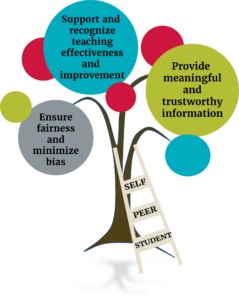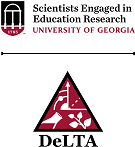
Robust teaching evaluation relies on three perspectives: students, trained peers, and instructor self-reflection. Robust evaluation can support and recognize teaching effectiveness and improvement, provide meaningful and trustworthy information for faculty and departments, and ensure fairness and minimize bias.
How do you support teaching evaluation practices in your department?
Thinking critically about our teaching, and engaging in processes for the evaluation of teaching, is an important part of faculty life at UGA. As depicted in the image above, when this work is done well it helps to ensure fairness and minimize bias, it leads to the support and recognition of teaching effectiveness and improvement and helps to provide meaningful and trustworthy data and information.
Click through each of the following to learn more about leveraging each of the three voices for the evaluation of teaching at UGA:
This resource – developed by the DeLTA Project and in partnership with the CTL – is intended to provide guidance and support for you, as you draw on three voices (students, peers, and the instructors themselves) to evaluate your teaching effectiveness. It also aligns with UGA’s requirements for evidence of teaching effectiveness for promotion and tenure, and university-wide teaching evaluation policy.


